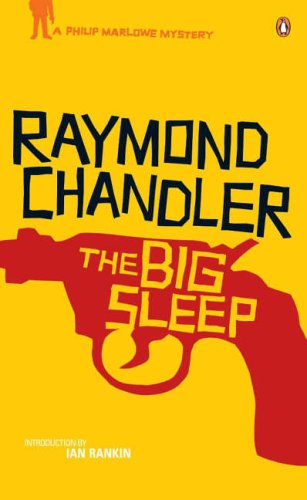|
The Spirit of Pulp - Raymond Chandler's The Big Sleep

The Big Sleep was Raymond
Chandler's first Philip Marlowe novel and published in 1938. It
introduces us to his famous hardboiled detective hero, a combination of
Chandler himself and the traditional pulp hero. Marlowe remains an
entertaining, even complex hero as our window into these stories. He's
boorish but sensitive, full of bitterness but imbued with a sense of
honour and idealism, a loner and borderline alcoholic who nevertheless
still dresses sharply and does his best to make the world a better
place.
As much as anything it's
Marlowe's sarcastic sense of humour that still makes these books fun to
read today. His endless dry observations and musings on the strange
people he invariably meets over the course of a typical day in his
singular line of work. "Mr Cobb was my escort. Such a nice escort, Mr
Cobb. So attentive. You should see him sober. I should see him sober.
Somebody should see him sober. I mean, just for the record. So it could
become a part of history, that brief flashing moment, soon buried in
time, but never forgotten - when Larry Cobb was sober."
The book is set in post-war Los
Angeles and begins with Marlowe called out to the mansion of the
wealthy General Sternwood. The General, who is elderly and an invalid,
is having trouble with his young wayward daughters. Vivian has been
running up gambling debts while Carmen is an opium addict who has posed
for naked photographs. Someone is now threatening to blackmail
Sternwood with the negatives.
Sternwood is unwilling to pay
the blackmailer off but also aware that he is too old to keep constant
watch over his daughters now. He hires Marlowe to investigate the
blackmail attempt and smash any crooks behind the scheme. This will be
easier said than done of course and Philip Marlowe is inevitably going
to get rather bruised and battered before this knotty case is through.
Further intrigue is supplied by Vivian's husband Regan having
disappeared. Was he involved in the blackmail? How about the bookseller
Arthur Geiger? Marlowe has no shortage of lines of inquiry as he begins
a case that's going to require an industrial amount of black coffee to
crack.
This is a great crime novel with
a hero who always sounds like he has just drunk a copious amount of
scotch, been pistol whipped and is now eating scrambled eggs at three
o'clock in the morning as the rain puddled alleys outside shimmer under
street lights and almost sigh with loneliness and lost dreams. These
books are not a million miles away from Fleming's Bond books (obviously
without supervillains trying to take over the world) but they are
better I think. Chandler has a great sense of style and has survived
parody and sniffy critics who feel his work is too pulpy to be
considered truly great.
I like his descriptive
sense in this story. Maybe he's too pedantic at times but it gives you
a great sense of location and always chimes with Marlowe's own way of
expressing himself. "The main hallway of the Sternwood place was two
stories high. Over the entrance doors, which would have let in a troop
of Indian elephants, there was a broad stained-glass panel showing a
knight in dark armor rescuing a lady who was tied to a tree and didn't
have any clothes on but some very long and convenient hair. The knight
had pushed the visor of his helmet back to be sociable, and he was
fiddling with the knots on the ropes that tied the lady to the tree and
not getting anywhere. I stood there and thought that if I lived in the
house, I would sooner or later have to climb up there and help him. He
didn't seem to be really trying."
This style is a fusion of
Chandler the former poet who had an English education and the all
American Chandler who furiously wrote pulp detective stories. It's an
enjoyably twisty and at times bizarre story that taps into the seedy
underbelly of life in the city. Marlowe is endlessly threatened and
beaten up but doggedly sticks to his mission and all is eventually
revealed. The clever thing about the construction of the story is that
it isn't really a whodunit. Rather than clues the suspense comes from
atmosphere and our real curiosity is always not who committed the
crimes but rather what Marlowe will make of it all. Clever stuff.
- Jake
c 2015
Alternative 007
|

|


